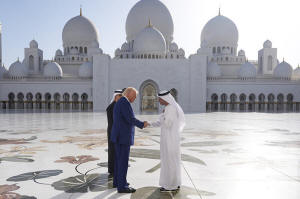Trump says the US and Iran have 'sort of' agreed on the terms for a
nuclear deal
[May 16, 2025]
By ZEKE MILLER and AAMER MADHANI
ABU DHABI, United Arab Emirates (AP) — President Donald Trump said
Thursday that the United States and Iran have “sort of” agreed to terms
on a nuclear deal, offering a measure of confidence that an accord is
coming into sharper focus.
Trump, in an exchange with reporters at a business roundtable in Doha,
Qatar, described talks between American envoy Steve Witkoff and Iranian
Foreign Minister Abbas Araghchi as “very serious negotiations” for
long-term peace and said they were continuing to progress.
Still, throughout his four-day visit to the Gulf this week, the
president has underscored that military action against Iran’s nuclear
facilities remains a possibility if the talks derail.
“Iran has sort of agreed to the terms: They’re not going to make, I call
it, in a friendly way, nuclear dust,” Trump said at the business event.
“We’re not going to be making any nuclear dust in Iran.”
Without offering detail, he signaled growing alignment with the terms
that he has been seeking.
A top political, military and nuclear adviser to Iran's supreme leader,
Ayatollah Ali Khamenei, told NBC News on Wednesday that Tehran stands
ready get rid of its stockpiles of highly enriched uranium that can be
weaponized, agree to enrich uranium only to the lower levels needed for
civilian use and allow international inspectors to supervise the
process.
Ali Shamkhani added that in return, Iran wants an immediate lifting of
all economic sanctions.

On Thursday, hours after Trump said the two sides were getting closer to
a deal, Araghchi said Tehran's ability to enrich uranium remained a core
right of the Iranian people and a red line in nuclear talks.
“We have said repeatedly that defending Iran’s nuclear rights —
including enrichment — is a fundamental principle,” the official said.
“This is not something we concede, either in public discourse or in
negotiations. It is a right that belongs to the Iranian people, and no
one can take it away.”
Trump said his demands have been straightforward.
“They can’t have a nuclear weapon. That’s the only thing. It’s very
simple,” Trump said. “It’s not like I have to give you 30 pages worth of
details. It is only one sentence. They can’t have a nuclear weapon.”

But Trump on Wednesday suggested he was looking for Tehran to make other
concessions as part of a potential agreement.
Iran “must stop sponsoring terror, halt its bloody proxy wars and
permanently and verifiably cease pursuit of nuclear weapons,” Trump said
in remarks at a meeting in Saudi Arabia, the first stop on the Mideast
trip. “They cannot have a nuclear weapon.”
Before moving on to the United Arab Emirates from Qatar on Thursday,
Trump stopped at a U.S. military installation at the center of American
involvement in the Middle East and spoke to U.S. troops. The Republican
president has used his visit to Gulf states to reject the
“interventionalism” of America’s past in the region.
[to top of second column]
|

President Donald Trump shakes hands with with Yousif Al Obaidli,
director of Sheikh Zayed Grand Mosque, during a tour of the Sheikh
Zayed Grand Mosque, Thursday, May 15, 2025, in Abu Dhabi, United
Arab Emirates. (AP Photo/Alex Brandon)

Al-Udeid Air Base was a major staging ground during the U.S. wars in
Iraq and Afghanistan. The base houses some 8,000 U.S. troops, down
from about 10,000 at the height of those wars.
Trump told the troops that his “priority is to end conflicts, not
start them.”
“But I will never hesitate to wield American power if it’s necessary
to defend the United States of America or our partners,” he said.
Trump has held up Gulf nations such as Saudi Arabia and Qatar as
models for economic development in a region plagued by conflict. He
urged Qatari officials to use their influence to entice Iran to come
to terms with his administration on a nuclear deal.
Trump later flew to Abu Dhabi in the UAE for the final leg of his
trip. He visited the Sheikh Zayed Grand Mosque, the country’s
largest mosque. The UAE’s founder, Sheikh Zayed, is buried in the
mosque’s main courtyard.
Trump took his shoes off, which is customary, as he stepped into the
house of worship and spent time marveling at the architecture.
“It's beautiful,” Trump said.
He was later attended a state visit hosted by UAE President Mohammed
bin Zayed Al Nahyan at the Qasr Al Watan presidential palace. Trump
and his delegation were greeted by young children wearing
traditional robes and waving small U.S. and UAE flags, and they were
guided through a space exhibit inside the palace.
Al Nahyan also presented Trump with the Order of Zayed, the UAE's
highest civil decoration and credited Trump with building the two
nations' economic partnership to new heights.
“This partnership has taken a significant leap forward since you
assumed office,” he told Trump.
As he made his way to Abu Dhabi on Thursday, Trump reminded
reporters about President Joe Biden’s 2022 fist bump with the Saudi
Crown Prince Mohammed bin Salman, a moment roundly criticized by
human rights activists already upset by the Democrat's decision to
hold the meeting. Trump noted in contrast that while in Saudi Arabia
and Qatar this week, he had shaken many hands.
“They were starving for love because our country didn’t give them
love,” Trump told reporters aboard Air Force One. “They gave him a
fist bump. Remember the fist bump in Saudi Arabia? He travels all
the way to Saudi Arabia … and he gives him a fist bump. That’s not
what they want. They don’t want a fist bump. They want to shake his
hand.”
___
Madhani reported from Dubai, United Arab Emirates. Associated Press
writer Amir Vahdat in Tehran, Iran, and Gabe Levin in Dubai
contributed to this report.
All contents © copyright 2025 Associated Press. All rights reserved |